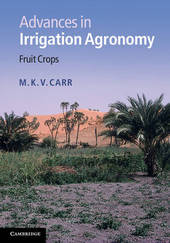
|
Advances in Irrigation Agronomy: Fruit Crops
Hardback
Main Details
| Title |
Advances in Irrigation Agronomy: Fruit Crops
|
| Authors and Contributors |
By (author) M. K. V. Carr
|
| Physical Properties |
| Format:Hardback | | Pages:350 | | Dimensions(mm): Height 252,Width 182 |
|
| Category/Genre | Agronomy and crop production |
|---|
| ISBN/Barcode |
9781107037359
|
| Classifications | Dewey:631.587 |
|---|
| Audience | | Professional & Vocational | |
|---|
| Illustrations |
11 Tables, black and white; 40 Plates, color; 115 Halftones, unspecified
|
|
Publishing Details |
| Publisher |
Cambridge University Press
|
| Imprint |
Cambridge University Press
|
| Publication Date |
27 March 2014 |
| Publication Country |
United Kingdom
|
Description
As global pressure on water resources intensifies, it is essential that scientists understand the role that water plays in the development of crops and how such knowledge can be applied to improve water productivity. Linking crop physiology, agronomy and irrigation practices, this book focuses on eleven key fruit crops upon which millions of people in the tropics and subtropics depend for their livelihoods (avocado, cashew, Citrus spp., date palm, lychee, macadamia, mango, olive, papaya, passion fruit and pineapple). Each chapter reviews international irrigation research on an individual fruit crop, identifying opportunities for improving the effectiveness of water allocation and encouraging readers to link scientific knowledge with practical applications. Clearly written and well illustrated, this is an ideal resource for engineers, agronomists and researchers concerned with how the productivity of irrigated agriculture can be improved, in the context of climate change, and the need for growers to demonstrate good irrigation practices.
Author Biography
M. K. V. Carr is Emeritus Professor of Agricultural Water Management at Cranfield University, UK. He has over 45 years of experience in the management and delivery of international research, education, training and consultancy in agriculture and natural resource management. He is the author of Advances in Irrigation Agronomy: Plantation Crops (Cambridge University Press, 2012) and former editor in chief of the Cambridge University Press journal Experimental Agriculture.
Reviews'This book is a scholarly work that will be used by researchers, academics and students alike. It presents a concise synthesis of the most up to date published information, supported by field observations from experienced practitioners as a guide to the irrigation needs of the Species covered. It shows the way forward in research needs and areas where practitioners need to be aware of likely issues and discrepancies that need to be addressed. The book is easy to read and is highly recommended to irrigation practitioners, agronomists and horticulturists. I commend Emeritus Professor Carr on this work.' Wayne M. Hancock, Southern Cross University, Australia 'Water will be critically importance in the future of food production, food security and economic development during the remainder of the 21st century. With agriculture and horticulture requiring increasing volumes of water science must provide information for farmers to irrigate their fruit crops effectively and efficiently. Professor Carr has written an excellent, easy to read, topical book that provides in depth information on water and irrigation requirements for eleven commercially important tropical or subtropical fruit crops. This text provides vital information from a range of sources; each chapter deals with water use and productivity of marketable products, indicates further research needs and ends with a critical summary of information on each crop. A perceptive and thoughtful final synthesis chapter highlights future challenges, advocating the need for integrative and holistic research linking plant physiology and commercial management. This book should be essential reading for students, researchers and consultants in fruit production.' Errol W. Hewett, Massey University, New Zealand 'The world food increase due to population increase, require similar increase in irrigation water, especially in dry countries where water resources are limited, therefore, there is a need to examine crop agronomic aspects to find the most effective methods to maximize crop production. This book will serve the above aim. The book will enrich the scientific community with a valuable source on fruit crops focusing on their agronomic aspects. I am confident that this book will be a valuable reference to professional agricultural scientists and researchers working in the field of agronomy, farm water management and extension. The book is also a valuable contribution for Agronomy students for its simple language. I know the author has a long and a wide field and research experience coupled with excellent scientific background. I hope this book will be well received by all groups and individuals in the agronomy and in agriculture circles.' Ahmed I. Alamoud, King Saud University, Saudi Arabia
|